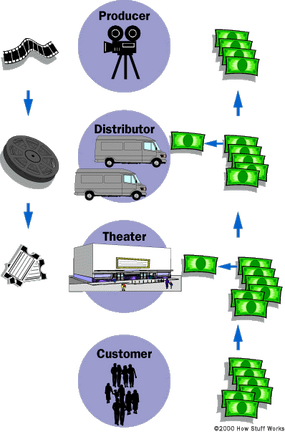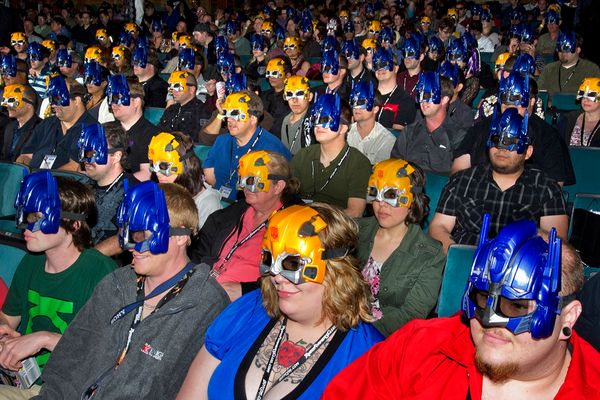It has been said that making a movie is not nearly as difficult as getting it distributed. Because of the enormous amount of cost in money and time involved in distributing a movie, a distributor must feel confident that they can make a sufficient return on their investment. Having the backing of a major studio or a well known director or star can greatly improve the chances of securing a good distribution deal. Independent filmmakers often use film festivals as an opportunity to get the attention of distributors. Once a distributor is interested in a film, the two parties arrive at a distribution agreement based on one of two financial models:
In the leasing model, the distributor agrees to pay a fixed amount for the rights to distribute the film. If the distributor and the studio have a profit-sharing relationship, on the other hand, the distributor gets a percentage (typically anywhere from 10 to 50 percent) of the net profits made from the movie. Both models can be good or bad, depending on how well a movie does at the box office. The goal of both the studio and the distribution company is to predict which model will benefit them the most.
Most of the major studios have their own distribution companies. For example, Disney owns Buena Vista, a major distributor. The obvious advantages of this are that it is very simple to set up a distribution deal and the parent company doesn't have to share the profits with another company. The big problem is when an expensive movie is a flop -- there's no one else to share the costs. That's the main reason several studios have partnered on major movies in recent years. For example, "Star Wars: Episode One" was produced entirely by Lucasfilm but distributed by Fox.
The next big step occurs once the distribution company has rights to the film. Most distributors not only provide the movie to theaters, but obtain ancillary rights to distribute the movie on VHS, DVD, cable and network TV. Other rights can include soundtrack CDs, posters, games, toys and other merchandising.
When a distributor has leased a movie, they will try to determine the best strategy for opening the movie. Opening refers to the official debut of a movie. There are several factors to consider:
- Studio
- Target Audience
- Star power
- Buzz
- Season
Obviously, a movie that has everything -- major studio backing, big stars and a great story -- is probably going to open big and do very well. If it has big stars but doesn't appear to have legs (meaning that it will not stay popular for long), the distributor may opt to put the movie in as many theaters as possible during its first engagement. Fewer theaters will be interested in a movie with an unknown cast or poor buzz (unofficial information about the movie). Sometimes a movie has gotten good buzz, but isn't likely to have mass appeal because of the audience it is directed at. It might also be the wrong time of year for a particular type of movie. For example, a heartwarming Christmas story is not likely to do well opening on Memorial Day weekend.
All of these factors help the distributor determine the number of prints to make. Each print typically costs about $1,500 to $2,000 to make, so the distributor must consider the number of theaters a movie can successfully open in. Many of the 37,000 screens in the United States are concentrated in urban areas. A popular movie might fill the seats in several theaters in the same city while another movie would have a much smaller audience. Since opening a movie on 3,000 screens could cost $6 million for the prints alone, the distributor must be sure that the movie can draw enough people to make the costs worthwhile.
Most theaters use buyers to represent them in negotiating with the distribution companies. Large chains such as AMC Theatres or United Artists employ buyers while small chains and independent theaters contract with a buyer. The negotiating process is very political. The buyers often will accept a movie that the theater is not very interested in to make sure they get a film they really want. Distributors try to balance the movies they lease to theaters in the same local area to make sure all of the theaters will continue to work with them. Sometimes a theater will get an exclusive or special engagement to premiere a movie in its area. Once a buyer is interested in a movie, the lease terms are discussed.



